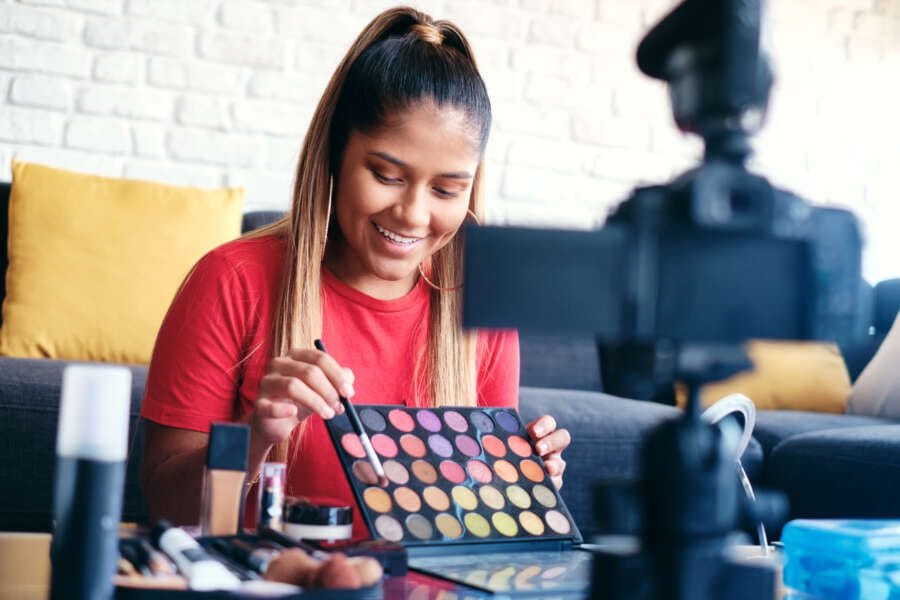
By Tasmine Williams, PR & Outreach Executive at Colewood Digital
10 years ago saw the start of bloggers and social media beginning to rise through
the ranks, although it’s fair to say that the industry could never have predicted
just how influential these platforms were going to be. While traditional methods
of marketing are still strong, how has the rise of influencers impacted businesses’
marketing strategies today?
Instagram alone now has over one billion active users, meaning 1 in 7 of us across
the world have access to the platform – with this knowledge, it’s easy to
understand why this channel of marketing has boomed over recent years.
What exactly is influencer marketing?
Influencer marketing is a hybrid model that plays on both old and new methods
of marketing, taking the idea of celebrity endorsement and placing it at a more
attainable level for the target audience. It isn’t just celebrities that are classed as
influencers today, instead, it includes social media users who would never
consider themselves famous or well-known outside of the online world.
Partnering with influencers can helps your brand in the following ways:
- Reach a bigger audience
- Reach audiences with an existing interest in your niche
- Build trust for your brand
- Build brand awareness
- Increase site traffic
- Drive sales
What makes an influencer?
To put it simply, an influencer is someone who has the power to influence and
affect the purchasing decisions of others because of their authority, knowledge or
position, with a substantial following on social media.
A common mistake made in marketing is failing to see the distinction between
celebrities and online influencers; influencers have built a loyal audience who
follow them for their expertise and knowledge in their distinct topic and care
about their recommendations. Celebrities, on the other hand, are well-known for
their respective careers and although have a large following across social media,
are less likely to have an audience that trusts and values their opinion and posts.
Another misconception when doing influencer research is to only focus on
influencers with a large following, but this isn’t always the case. Some influencers
may only have 10,000 followers, but have developed a reputation as being experts
in their field and are most likely to be actively engaging with their audience on a
regular basis and hence have a much more loyal follower base.
How do we use influencer marketing to promote our product or business?
This method of marketing involves a brand working directly with an online
influencer to promote their product or service, or simply to increase brand
visibility and awareness.
An example of a brand who has done this well previously is Daniel Wellington. The
brand didn’t make much use of traditional marketing methods and instead
focused their strategy predominantly on influencer marketing. By working with
popular influencers to promote their watches on social media, they dedicated
followers using styled imagery and their branded hashtag, #danielwellington,
which now has more than 2.4 million posts, they have now amassed a following of
almost 5 million on Instagram.
They also offered each influencer a unique discount code to share with their
followers which could be used to get money off their own purchase, driving traffic
and sales to the site. Another bonus of this type of marketing is often brands can
repurpose the influencers imagery to use on their own social media, offering
plenty of content to use every day.
How do I implement an influencer marketing strategy?
Doing your research to find the right influencers is key, but be realistic about your
budget and who you can reach out to. If you don’t have a huge budget, don’t
expect influencers with a million followers to promote your product for free.
Instead, research smaller accounts in your niche who have a high engagement
rate, or even look at your existing customer base to see if anyone is suitable.
Influencers are often already customers of your business without you realising, so
this is a great opportunity to capitalise on.
Remember that influencers are people, so don’t treat them like a sales pitch.
Similar to content marketing, this approach is about demonstrating your brand’s
credibility and authority in your niche, so making sure you work with influencers
who share the same brand values is key to a successful campaign.
Set your goals for each influencer campaign so you know what to promote, who
to promote to and on what platform. For example, if you are wanting to raise
awareness of a new line of jewellery, getting fashion influencers to share on
Instagram is the best avenue as this is a photo-based platform. The power of this
strategy has not gone unnoticed, with 75% of brands now intending to dedicate a
budget to influencer marketing this year alone. (Influencer Marketing Hub, 2020)
Finding the right influencer for your business
Once you have a target list of influencers, as a brand you should start interacting
with their posts so when it comes to pitching to them, they already know who you
are. When pitching to influencers, it’s important to remember that they will get
hundreds of requests from brands similar to yours looking to work with them, so
by doing a bit of legwork beforehand will ensure you stand out from the rest of
the noise they get.
Although 67% of brands use Instagram for their influencer marketing, this isn’t
the only place you can look to work with influencers, either. Other social media
sites such as Facebook, TikTok and especially YouTube can all be highly beneficial
sites to work on with influencers – 43% of brands use Facebook and 36% use
Youtube, according to Influencer Marketing Hub. Deciding which social media
site to go for entirely depends on your target audience, brand and your goals for
the marketing campaign.
An important point to note is how you approach an influencer when proposing
your idea. Make sure you tailor your pitch to each individual influencer and how
your product would suit their audience and fit their online brand and ensure the
collaboration is mutually beneficial.
How to grow your business with influencer marketing
Referrals and word of mouth are some of the most effective ways to promote your
business and influencer marketing is no different to this. When influencers tell
their followers about how great your product or business is, there is a much
higher chance they will convert because they trust that influencer’s advice and
knowledge. A study by Oberlo showed that 54% of social browsers use social
media to research a product before purchase and 70% of teens claim to trust
influencers more than traditional celebrities.
One of the main benefits of working with influencers to market your brand or
product is that they have a specific audience who are already interested in your
niche. This means that targeting these audiences are much more likely to drive
growth in site traffic and sales, as opposed to sending out a generic paid social
media ad that could be targeting people who have no interest in it. It can also
work out a lot cheaper than traditional paid advertising, too.
For example, if an influencer you plan on targeting has 50,000 followers and
charges £500 for an Instagram post and your average order value is £50, you can
see the return on investment increasing very quickly already. Of course, it’s
unlikely that all 50,000 followers will see this post, but even if 100 make a
purchase from this, that’s £5,000 of sales. That’s a deal you would take up any day
and would potentially look to focus a lot more of your budget on.
This is part of a huge and growing shift in how we prioritize recommendations
over traditional television, magazine and newspaper ads and it’s hard to ignore
the power of this new method of marketing.


